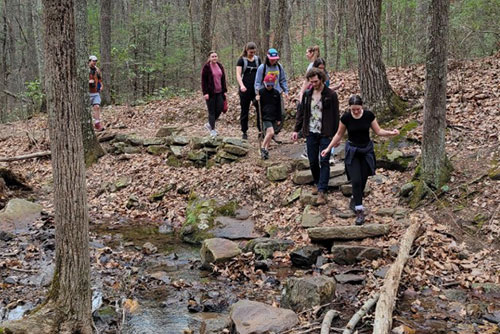How do you prepare for the physical demands of summer research in the Peruvian jungle? Take a hike!
by Chad Osborne
May 02, 2025
This summer, a small group of Radford University undergraduate students and faculty will spend three weeks conducting original research deep in the Peruvian jungle as part of RARE, the Radford Amazonian Research Expedition.
A portion of their time will involve moving from one research site to the next, often carrying bulky loads of gear necessary to complete their work. To prepare for the rigorous jaunts, the group has been taking long hikes together at nearby trails throughout the spring semester.

“The hikes are a great way to prepare because of how much hiking we’ll be doing in Peru,” said Cara Rossmeisl, a junior from Blacksburg, Virginia, majoring in biology and biochemistry. “The terrain isn't super difficult; we recently hiked Dragon's Tooth [near Roanoke, Virginia], and a previous RARE student who hiked with us explained that it likely won't be much more difficult than that in Peru. There will just be a lot of it.”
RARE provides Radford undergraduate students with a unique opportunity to conduct original research in a primary Amazonian rainforest ecosystem. This year, Associate Professor of Biology Tara Pelletier and Assistant Professor of Theatre Camilla Morrison will lead the group of select students through their individual projects deep in the Peruvian jungle.
The two faculty members organized the spring hikes to help students prepare for their upcoming work.
“Several of us, like myself, have research projects that will require hiking to collect environmental samples from various places near and around the research station,” Rossmeisl said. She is working with Pelletier to collect water samples and use DNA to detect a type of fungal infection that can have severe impacts on the native amphibian populations.
“We plan to perform all of this testing on-site, essentially using sized-down, specialized lab equipment,” Rossmeisl explained. “Thankfully, in my case, the only equipment I will need to lug around will be containers for collecting my samples.”
Ryan Stanley’s research equipment is relatively light, too. In Peru, the freshman biology major from Chantilly, Virginia, will set out to determine “if disturbances in the Amazon rainforest – like logging, agriculture, fires, etc. – have an impact on invasive species' ability to invade the rainforest and outcompete native species,” he said.
To do this, Stanley will collect insects from on or near disturbed lands, make note of their locations and determine if there are “less natives and more invaders at disturbed land,” he explained. “If I find more invaders, then that would support my hypothesis that disturbances do affect invasive species' ability to invade.”
To do the research effectively, Stanley will be on the move, walking from one jungle site to the next. The group walks, he said, will help them make great strides toward effectively conducting their research in the physically demanding Amazon.
“I think the biggest thing these walks will help me with is endurance,” Stanley said, “and I will certainly need to have good endurance when I am in Peru because it will be hours of walking every day.”
In addition to Dragon’s Tooth, the RARE researchers have hiked around Pandapas Pond in Montgomery County – “in the snow,” Pelletier noted – Claytor Lake and, most recently, they took to the trails at the university’s Selu Conservancy for a night hike so the group could test their gear and practice working with headlamps.
“The hikes, especially the one at Selu, are helping us gauge and prepare for handling this in the jungle,” Rossmeisl said. “It's good for us to build up some solid physical endurance to both enjoy ourselves to the fullest while we're in Peru and to help us complete our projects.”
At Selu, the team was also tasked with cooking a meal, which helps with team-building, Pelletier said, another important component to surviving three weeks in the Amazon.
“Watching the students get to know each other is the best part,” she said. “It gives everyone a chance to see who's going to fall into leadership roles, who will be the motivators when things get hard, the best navigators, the most resourceful, or best problem-solvers. Everyone has a role to play, and it's nice to figure some of that out before we are in the middle of the jungle.”